
Legal situation for foreign buyers in Sri Lanka








Freehold ownership for foreigners - tax-free

Freehold purchase and ownership
Foreigners can purchase freehold property in Sri Lanka - even with the 2014 law (Land Act No. 38, October 2014).
For freehold property purchases, foreign investors are required to invest through a Sri Lankan company structure. This company structure can be totally controlled by the foreign investor.
The foreign buyer has to start two companies and involve a Sri Lankan trustee. The trustee should be a reputed trusteeship service company, mostly headed by a lawyer.
Again: the investor has total control of this company structure since the local trustee will act as directed by the foreign investor.
The company structure allows the foreign investor to freely purchase, develop, rent and sell the property and collect all profits from running and selling the property holding company.
Beware of "solution" from advisors who are not reputedly specialized in the legal finesses of shaping the company structures and trusteeship contracts involving foreign investments! Ask for references!
The property purchase is tax-free (please note Stamp Duty for registration of ownership: 4%).
Investment, earnings/dividends and profits can be repatriated.
Costs of property purchase and company structure
Prices vary, but generally speaking one should expect approx. 3,000 USD for the initial incorporation of the company structure and approx. 1,000 USD per year to keep it alive.
Write to us to get more detailed information and a price list.
Important subjects we would discuss with you:
- Government stamp duties
- Government taxes
- Government assessment of value (basis to stamp duty and taxation)
- Company incorporation costs
- Trusteeship security and costs
- Running costs of the company structure and scope of services needed
- Lawyer’s fees for contract bundle “property transfer” and/or “property lease”
- Sale and repatriation of investment
- Repatriation of profits
- Set-up for legal rental / hotel business
- Relevant law governing purchase and lease of property by foreigners (issued October 2014, revision 01.01.2016)
- Last will/testament solutions
- Tamper-proof Special Powers of Attorney in case the investor can't visit Sri Lanka
Lease for up to 99 years
Foreign individuals or companies can lease a property for up to 99 years. Lease titles are officially registered and very safe.
The old 15% foreigners' tax on the lease value has been abolished, effective from 01.01.2016.
A foreigner can presently lease tax-free as an individual or through his company. Please note the 1% Stamp Duty for registration of a Lease.
The remaining years of a lease can be sold to any third party at any price.
Even in case of a "lease only" investment the foreigner is well advised to incorporate an investment company to be able to repatriate his money (Rupees) in case of him selling the remaining years of his lease. Without a company being the lessee selling a lease with a profit the Revenue Department might ask for a taxation of profit.
Write to us to ask for details.
Lawyers and professionals for company incorporation
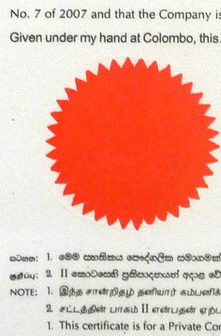
Foreign investment needs specialists also on the legal, company and taxation side. Such experts are difficult to identify because many not sufficiently qualified individuals try to win the foreign investor and his money.
We can recommend a one-stop-solution involving a leading Colombo law firm with a long standing reputation
Scope of service (you select the modules!):
- Property title check (written title report with detailed pedigree of pre-ownership and clear recommendation to buy or not buy a property)
- Setting up the special bank account for foreign investors (required by Sri Lankan law)
- Incorporation of two companies (name approval, registration, issuing of shares, initial resolutions, payment of government fees etc.)
- Setting up company bank accounts
- Legal work (notarial attestation of property transfer, lease agreement, last wills / testaments, powers of attorney, trusteeship agreement)
- Trusteeship services provided by a Trusteeship Services company
- Secretarial services (required by Sri Lankan law to run a company)
- Book keeping
- Audits
- Legal and tax work in case of re-sale
Write to us and ask about details.
Total costs of ownership (TCO) before resale
When looking at your investment you need solid figures. ALL costs (lawyer, broker, taxes, stamp duties, any secretarial, legal, accounting and other running services) over the years are included. Not included: electricity and water. Town council taxes are too small to mention (e.g. 20 US$ per year).
In case of a resale in the future the company structure is definitely better than lease. Reasons:
- Lease is more difficult to sell to foreigners and even more so to locals.
- Selling a leased property mostly means that the official owner sells the freehold and you cancel the lease. Income generated by cancelling a lease can create tax problems in you home country (whereas sale of freehold and sale of shares don't, according to most double taxation treaties).
Sale profits and property value appreciation
Every fact speaks in favour of a company structure!
After a lifetime of 20 years with foreign minority shareholding the property holding company qualifies for 100% foreign shareholding. So with each year the company becomes more attractive and more valuable.
At the same time you enjoy the appreciation of the land value.
With the ongoing growth in tourism your yearly returns will grow (if you rent out) or the value of only privately used property appreciates since it WOULD generate a substantial rental income after your successor buys it.
You can easily repatriate ongoing profits from rentals and final sales profits by being an officially registered investor.
Rental income
Villas and even more modest houses are very much sought after by all kinds of tourists these days. You can generate a decent income to re-finance your investment and its running costs.
You need decent staff and tight supervision for your guests to be satisfied and recommend you (to other friends and on the various platforms on the internet).
We strongly recommend to give the villa management in the hand of experienced professionals. That way your success is guarantied.
Write to us to ask for recommendations.
Don’t forget to make your rental operation legal! Else you’ll be the target of unsatisfied (fired) ex-staff, jealous neighbours or competitors.
Future sale
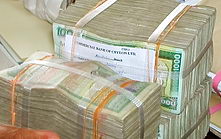
Company structure is a must
You can easily sell your property by selling your company structure as a whole to your foreign successor. Both of you will no have to pay taxes on sale / purchase. If your buyer is a local person or company (rare but not that rare) a well constructed company structure allows you to sell the property off the company without any taxation, too.
Repatriation of investment and profits
If you sell and receive Rupees you may legally exchange Rupees in US$ or Euro and repatriate your sale proceeds - always under the condition that the property was part of a company structure.
Repatriation
Re-sold investments or profits can easily be repatriated (= changed from Rupies to Dollars/Euros) if the investment went through a IIA account (formerly called SIA and before that called SIERA). Investors who have invested directly from their pocket of through a local friend will have quite a bit of red tape to get their Rupies from a sale of their investment legally exchanged into foreign currency and get the money out of Sri Lanka legally.
Again: with a company structure and a IIA account the investor has no problems at all.
Where to get a waterproof company structure
We have worked with all leading firms offering company structures and trusteeship services. And we know which one has its strong spot where. Feel free to ask!
Residence visa
Tourist visa
If you want to spend only up to 6 months per year in Sri Lanka you should obtain a 3 month Double Entry visa at your next Sri Lankan embassy. The visa can be extended for another 3 months at the Department of Immigration and Emigration in Colombo. There you should be prepared to present a return flight ticket, a credit card, proof of US$ / Euro officially exchanged in Sri Lanka (cash or by bank transfer from abroad). Usually 1,500 US$ exchange during the present stay is sufficient.
I doesn't help you to claim that you own property in Sri Lanka or run a business. Being a director of a company doesn't give you any more right to stay that seeking relaxation as a holiday maker.
Resident visa for people being 55 years or older
The "My Dream Home Programme" grants 2 years residence visas to foreigners 55 years of age or older. You need to make a deposit of 15,000 US$ and proof a regular income of 1,500 US$ per month sent from abroad to Sri Lanka. The foreign "spouse" needs to get an additional 750 US$ income per month. The mandatory health insurance will be provided in Sri Lanka (at something like 500 US$ per year).
After two years you have to proof your income to the authorities and show a positive police report (being a formality) that is obtained easily.
There are professionals helping you passing the procedure.
Business visa
There is a constant discussion whether it's better to visit on a business visa or a tourist visa. When meeting in Sri Lanka we can talk about it.
Residence visa for businessmen
When you run a business with the approval of the Board of Investment (usually meaning well beyond 250,000 US$) you qualify for a classic residence visa and a permission to work. With a recommendation of your "line ministry" you also may obtain such a visa. Several hundred foreign professionals have obtained such a visa. Let's talk about the matter when we meet in Sri Lanka.
Inland often beats beach

Beach properties
Tourists prefer to stay at the beach. Thus beach plots, beach villas and beach hotels are the prime investment. However, they are the most expensive to buy and have the highest maintenance costs. The choice has become extremely limited because most of the obviously best (view, proximity to Galle Fort etc.) are owned by people who don’t consider selling or ask seemingly sky rocketing prices..
Most beach properties between Beruwela and Weligama are adjoining the very busy and noisy Galle Road. You can block off the noise by incorporating certain architectural features in your construction. The quiet plots (Weligama, Dickwella, Tangalle area, but also Balapitiya between Hikkaduwa and Bentota) deserve closest attention even if they might – today! – not be in the middle of a tourist area.
The Costal Conversation Department limits the height and location of construction at the beach. The more distance between water line and opposite boundary the better.

Inland properties
Inland = lower prices, more choice, no regulations
You can select from many reasonably priced properties. Inland you find spectacular views over lakes, lagoons or rivers, over rice fields or tea plantations, and elevated locations with panoramic views of 5 – 15 km. You can practically build what you like where you like and as high as you like.
For the reasons mentioned inland properties nowadays often beat beach properties.
Almost all properties are “remote” properties
Let’s face it: under the tourist point of view any place further than walking distance off the beach or the Galle Fort is “remote”, and to remedy the disadvantages of remoteness you simply need a vehicle with driver that’s available within 20 minutes of you calling him and will transport the tourist wherever he wants for free or by fixed charge per kilometre and for each hour of waiting.
Best views and best prices you can find off the beaten tracks. So why not consider investing a few kilometers (meaning a few car minutes) inland?
For your own transport I strongly recommend that you rent a small car. With your self-drive vehicle you are inpedendent of drivers and weather and you don't have the hassle of car ownership. A Suzuki Alto will cost you 15 USD per day. Note that you have to get your international driver's license approved by the AAC in Colombo (ca. 25 USD, one passport photo and 30 min waiting); such an approval can be handled by the rental company in advance (e.g. by Mal-Key).
As an investor you should keep in mind that 15 years ago Thalpe was considered ridiculously remote. Meanwhile it has become a hotspot for villa investment. In my opinion up to 15 minute drive from the beach is okay for tourism, up to 30 min drive is okay for private residence – always under the condition that the location is really special.
More on transport and self-drive rental cars you find on a tab below.
Ask us to consult you on the matter helping you to make the right choice.
Where are the present hot spots?

It should be said that in the very early days (1980 - 1990) most foreigners bought and/or built in the Beruwela / Aluthgama / Bentota area. Some of these foreign owned houses are for sale today, but practically none meets modern building standards. Reason: at the time of construction many materials were not available in Sri Lanka that are common now.
Hikkaduwa also has quite a strong number of forreign settlers but most of them built on limited budget. The nice, large and expensive villas you mostly see either in the Galle area, particularly Thalpe (near Unawatuna), or scattered all over the stretch from Galle to Tangalle.
Special attention should be directed to the Galle Fort. The World Heritage Site is the by far most sophisticated touristic spot in Sri Lanka. Many foreigners have bought and renovated villas there - a very costly hobby that seems to be profitable nevertheless.
Nightlife you find in Unawatuna and much less in Hikkaduwa. Large size hotels are located in Bentota, Aluthgama, Beruwela and much less in Hikkaduwa.
Since 2020, Ahangama, Mirissa, and Weligama have quickly become popular with the younger western crowd. Even in Matara we now find attractive developments now.
The areas
Beruwela / Aluthgama / Bentota
In the former fisher village of Beruwela many foreigners own houses since the early 1980s - right after the hotel tourism has started and seen guests falling in love with Sri Lanka. Beruwela has since grown substantially. Formerly isolated properties are now in the middle of - usually upper middle class- neighbourhoods.
You find rather more German speaking foreigners in Beruwela than those of British or Australian origin.
Aluthgama is the main town adjoining Beruwela. A wide selection of services and shops is found here. Many foreigners live in houses in this area, too, though it's not as high in demand as Beruwela - with the exception of the river properties.
Bentota used to be a small fisher village before half a dozen of large hotel developments turned into one of the most popular destinations in the south-west of Sri Lanka. Many former guests of the hotels have invested in private property here.
South of Bentota you find smaller hotels and foreign investment in Induruwa. Other villages might have the occasional foreigner here and there, but hardly in "clusters". Ahungalla (where the famous Heritance Hotel - formerly Triton is situated) has some holiday homes, so does Kosgoda.
A bit further south we find Balapitiya with very nice beaches and still good chances to purchase at a rather low price since this area isn't yet in the focus of investors.
Hikkaduwa / Ambalangoda
Hikkaduwa was the first and most popular area for back packers, starting its success in the mid 1970s. Still the village has only few hotels (situated at the least attractive stretch of the beach) and will not change, because the uncounted guest houses lining the beach are all family owned businesses on small properties with the Galle Road in their backs. There is not enough space to build big hotels there.
However, in the last few years we have seen quite a few run down guest houses changing hands and being knocked down to make space for modern, more sophisticated construction for the up-market clientele.
Many former back packers - now in their 60s or older - have purchased property in the Hikkaduwa area. And Hikkaduwa keeps being attractive to newcomers because it has the charm of individual tourism (with many young surfers coming mainly from Australia), a lot of different beach restaurants and still the best value for the money (due to the family competition at the beach).
Inland from Hikkaduwa one finds many beautiful green areas with quite a few foreigners having houses there (e.g. Gonapinuwala area, 5-6 km off the beach).
Ambalangoda is more a town than the village Hikkaduwa, but has only little tourism. In the last few years some foreigners bought property in this area because is was a bit cheaper than Hikkaduwa and only a few minutes away. The coast north of Ambalangoda has picturesque stones (Balapitiya).
Between Ambalangoda and Hikkaduwa you find some nice beaches, but the disadvantage here is the fact that they all are located next to the Galle Road. Only Balapitiya has beach property off the noisy traffic.
Close to Hikkaduwa, but not so popular, are the villages further south, particularly Dodanduwa and Rathgama with the large lagoon there.
Between Hikkaduwa and Galle you find still few foreign investments. Early movers would be places like the famous boutique hotel Aditiya in Rathgama - others have followed their example. Advantage of the area: still there are some beach spots off Galle Road.
However, by 2024 you even find the small beach plots next to the Galle road in villages like Boosa being full of small guest houses.
Galle / Unawatuna / Thalpe / Kogalla
Galle is the main citiy of the province with a lot of cultural activities - second only to Colombo. The Galle Fort is a UNESCO World Heritage site, and some 70 investors have bought and spent millions of dollars to jazz up the old houses there to coffee table book beauties. The Galle Fort foreigners are a particular crowd - wealthy and of English origin (many having made their fortunes in Hongkong and turning their interest to Sri Lanka after Hong Kong being handed over to China).
Besides the Fort hardly any foreigners have houses in Galle town.
Unawatuna was once considered the most beautiful beach in the world - but wild construction activities, beach erosion and beach discos have spoiled this quite a bit. Investors prefer now locations off the over-busy beach. Many beautiful houses are found at the slope of the Rumasala hill north west of the bay and in the sloped of flat areas around Unawatuna. The prices are rather high here, and you find some extraordinary villas.
Thalpe (Talpe) is situated east of Unawatuna and is known to be the area most popular among wealthy foreigners. In the 1980s it was considered far, far away from everything, and at that time only five cars per hour would be counted on the Galle-Matara road on a busy day. Beautiful emerald coloured water, a mix of coral reefs, sand and rocks attracted the rich to build spectacular beach villas - many of which are today run as boutique hotels. Being close to Unawatuna, one can enjoy the many restaurants of this still popular place.
Many of the beach properties - nothing but poor yield coconut plantation even during the 1990s - were sold to large scale investors during the 2003 and 2004 bonanza, when foreign investors didn't have to pay the 100% property tax that was levied on property purchase before and after (and can today be avoided with intelligent legal constructions of the foreign investment).
Habaraduwa, the beach village at the Kogalla lagoon, became the cheaper alternative for those who couldn't afford Thalpe. The prices are appreciating here quickly.
The Kogalla lagoon has seen a big growth in attractivity for foreigners during the last ten years. The natural beauty and the fact that at some part of the lagoon there is little population were the main arguments in favour of this location. And its quiet - though still close to Unawatuna (restaurants and all year swimmable beach) and Galle Fort (upper class restaurants). Like in the Galle Fort or Thalpe it was mostly the British / Hong Kong upper-class crowd that invested in properties around Kogalla lake.
Weligama / Mirissa / Midigama / Ahangama
Weligama has become a spot of high interest. The large bay with the famous Taprobane Island close to its beach has seen quite some development in the last years. Some well elevated property at the beach and close by wait for investors. The prices here have doubled in no time.
There are some beach locations off the main road west of Weligama that are extremely sought after.
Mirissa is a beautiful bay, too, and the peninsula has spectacular views over the ocean.
Between Mirissa and Matara there are quite a few very beautiful spots, too. Some have a substantial distance to the main road.
From Weligama on you'll have less rain. Make sure you have a good well on your property for the dry season!
On this stretch of the coast one finds some of the best surfs in the world.
Matara / Dickwella / Tangalla
Matara itself now is connected to Colombo by the new express. The town of Matara and also the Polhena Reef area of Matara are of growing interest for foreign tourists.
From Dondra over Dickwella to Tangalla you find some of the most beautiful beaches in Sri Lanka - coming with sand and rocks, some with cliffs and soft elevations. Still it's mostly larger investors who are attracted by this area.
Area and price
The Sri Lanka property market is as "exploited" and professionalized as one sees it in other countries. Prices reflect popularity.
The market is growing and the prices are appreciating because tourism increases at a fast pace. Today money can be made with all kinds of rentals. Most importantly for our investor clientel a good income can now be generated with villa rentals, with small boutique hotels and with guest houses in the lower price segment.
Beach generates the easiest and biggest money - therefore beach properties have to high price tag. Inland properties close enough to the beach are particularly interesting for tourists who don't want to listen to traffic or discos. They are very popular for families or older tourists who have a lighter sleep. Thus the mid range prices for anything up to 2 - 3 km off the beach. Further inland you mostly pay for scenic qualities or colonial architecture.
Let me emphasize again that the availability of all kinds of transport has changed immensly over the last few years. 10 km off something was end-of-the-world only 10 years ago. Today it's a phonecall to one of the 10 drivers who's phone numbers ons stores in one's cell phone - or better even the 15 US$ per day rental car that you just hop in and start.
Independence by driving a rental car
Inland = you need regular transport
Living more than walking distance off the beach means you need transport. If you don’t want to depend on tuk-tuks or van taxis you’d better rent a car and drive yourself – which is the easiest and safest mode of transport.
Tuk-tuks: cost 0.30 US$ per km because there are no metered taxis in tourist areas. Tuk-tuks provide zero safety zone and only little protection against rain. Tuk-tuks are a drag on only in wet weather but also in city traffic (fumes, heat), in the night and generally when covering distances beyond 15 km. Drivers are not always available, definitely not after 9 p.m. Drivers might not drive as cautious as you desire.
Van taxis: high costs (0.40 US$ per km and more). Mostly has to be booked a day or more in advance. Usually not available for short distance. Often not even available for 50 km trips (e.g. to Galle and back). Generally have a problem with waiting for you, particularly in the evening. Many tourists seem to become slaves of their drivers. Do you want to become one.
Highly recommended: self drive rental car. 15 –25 US$ per day from a leading Colombo rental company. They pick you up at the airport, clear your international driver’s license, and bring you through Colombo to your holiday destination. I litre of petrol = 1.25 US$ = enough for a minimum of 10 km driving.
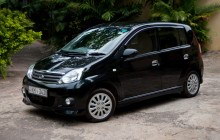
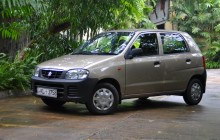
Daihatsu Charade automatic Suzuki Alto (manual)
Write to us to ask for car rental recommendations.
Build your villa with professionals
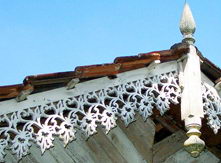

Turn-key is easy - and often the best choice
The houses that meet middle class or higher standards of western life style will cost almost as much to build as their equivalent in western countries. Why? Materials cost the same all over the world. Sri Lankan workers might get less money per hour, but they don't use the scope of time saving tools that are common in the west. And, most importantly, there are hardly any prefabricated and thus effectively (and "cheaply") produced modules to be used in construction. Everything will be made by hand with rudimentary tools. Doors and windows are made from fresh (wet and warped) wood.
Low priced houses
Average Sri Lankan middleclass family floor plan, décor and construction quality don’t match western expectations. Only westerners with a very limited budget (below 100,000 US$) buy such houses and use them.
The costs of a complete renovation are difficult to calculate.
Hardly any turn-key developments
Except for highrise condos there are hardly any on-spec developments for western investors. Given the demand for turn-key properties this might be a good business for you to start!

Get your villa(s) built!
Well over 50% of all our clients start a construction! And why not? It is well doable at a price one can only dream of in western countries. In Sri Lanka you can hire the best architects and supervisors, specialists for villa construction.
Ten years ago it was difficult to find a decent constructor and almost impossible to get a reliable and competent supervisor. This has changed dramatically. After the sophisticated reconstruction of dozens of Galle Fort villas and after having built quite a few luxury villas and pools for western investors we now have a group of experience architects, constructors and supervisors who are able to realize any design you have in mind. Regular reporting by email (with photo documentation) and Skye conferencing is the standard with these professionals. You don’t have to spend months on the site nor do you have to come for emergency visits.
Examples:
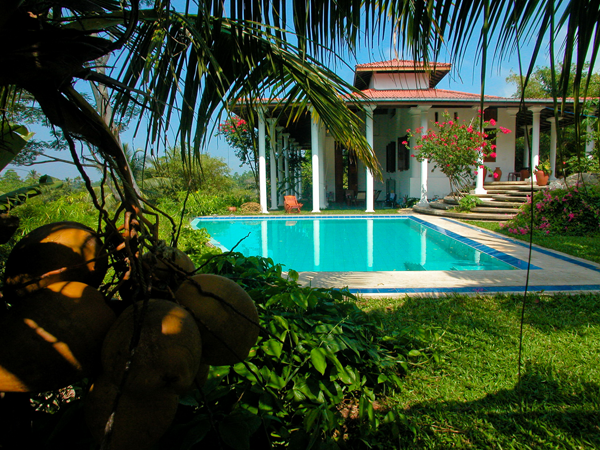
We did the construction of this outstanding villa
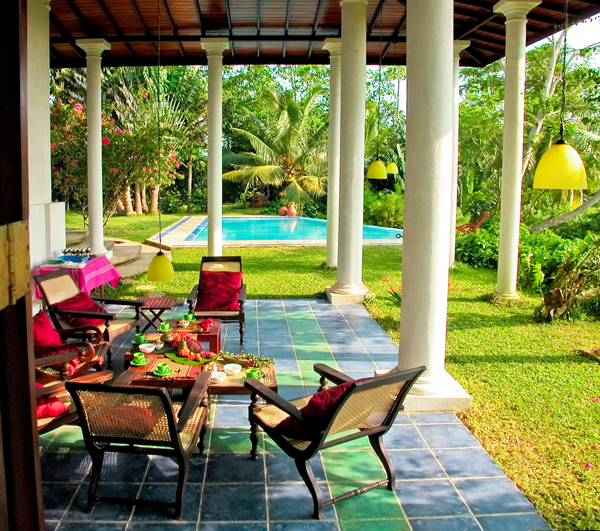
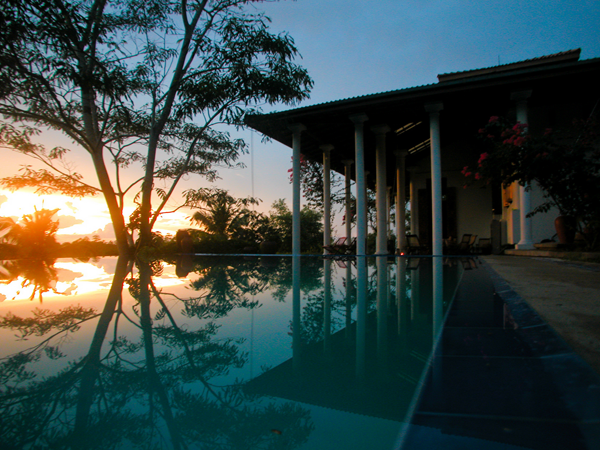
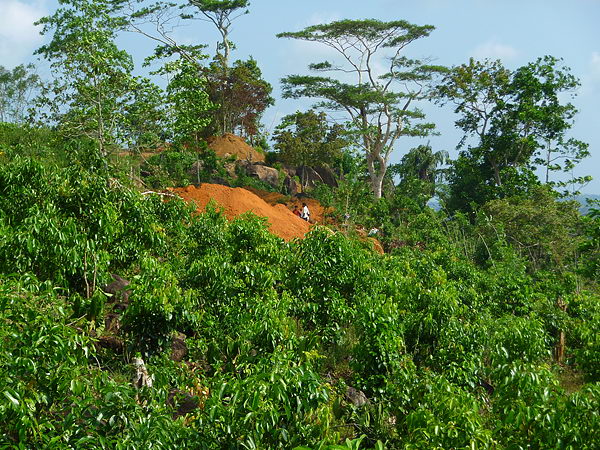
Another example: one of our constructions sites on a steep elevation
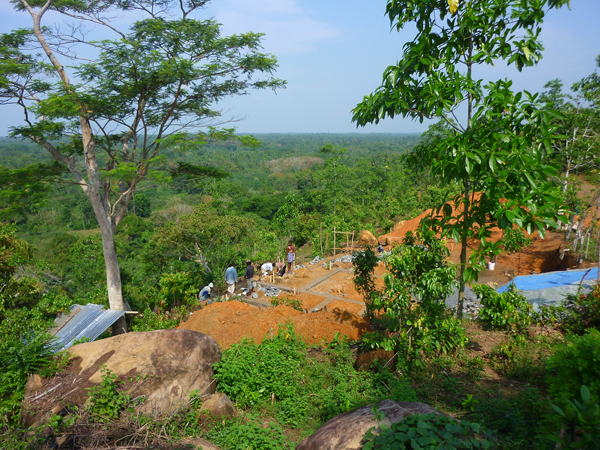
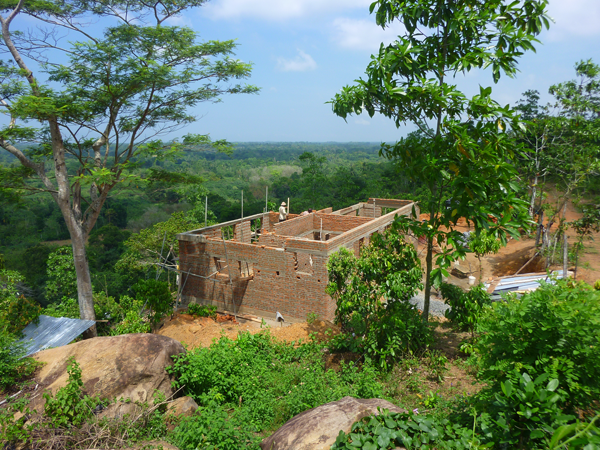
Get your colonial villa renovated and modified
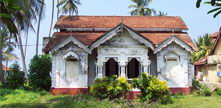
Every colonial villa (called Walauwa) will need a new roof, new wiring, additional bathrooms, a western kitchen and new floor. This can be done – this is done regularly by specialists, particularly in the Galle Fort, where the Archeological Department is scrutinizing the work to meet highest standards. Hire these experts for your colonial villa project! If you need an brand new annex in the same style it will be done. We can show you reference examples.
If you wanted a colonial villa from scratch it could be done. Mind that in Sri Lanka still doors and windows average local houses are hand made from tropical hardwood by carpenters – like 150 years ago. The craftsmen are there and the prices are moderate.
We and our partners will help you select the right people. It’s our job to show reference projects to you and provide the transparency and accountability you expect and are used to from western countries.
Constructing yourself is where the profit is made
Having your own project built is profitable. When you rent out your villa there is substantially more return of investment than after having bought a turn-key project. If you sell you villa your profit will be substantially higher in case of a self constructed house.
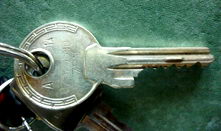
Horror stories and what to learn from them
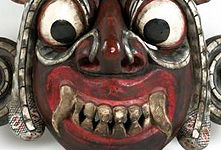
“I have heard many horror stories”
Let’s analyze the background of these stories, which always is similar: “I trusted a friend like my brother/son, listened to his advice, gave him my money” – and lost everything.
All these horror stories have one thing in common: the foreign investor trusted “friends” and got cheated. I don’t know horror stories involving reputed brokers, consultants, law firms or company secretaries.
Reputed professionals or amateurs?
The professional has worked hard to build up a reputation for himself over years and in an environment of competent competitors. One serious mistake (not to speak of fraud) and his source of income is gone. The leading professionals in the Sri Lankan market for up-scale foreign villa investors all are extremely careful and cautious to perform decently. Yes, the ask money for their services. So is every professional in the world. They might not be the cheapest. So is every expert in the world.
An amateur is a small time operator with no name nor reputation to lose. He has no education on the fields that are important to the investor. If he in the role of the amateur messes up completely then that's bad luck for investor with the money. In case of a crook the same applies. No crime was committed.
Amateurs might be the nicest and most honest chaps. Great friends. And they even might not be spoiled or tempted by the money the investor brings with him and the immense trust he has. But even being perfectly benevolent the amateur will cause harm to an investment just be being amateurs. Some smaller, some bigger.
I strongly recommend to meet with professionals and challenge them yourself, like you would at home. Ask for proof of reputation. Ask for people who can recommend the professional. Ask for reference projects.
Stay closest friends with the amateur, but don't risk to do business with him. Use the services of professionals.
Differences between professionals, amateurs and crooks
Selection of property and location
Professionals
Based on knowledge, experience and facts, professional brokers will provide recommendations according to the requests of the client. The client can select between the most suitable purchase or lease options.
Amateurs
Even the most benevolent local friend will always prefer the property that’s closest to his family home (future job on site without having to move and travel to the job site).
Local friends always vote against rural plots. They are afraid of the locals there (no joke!). To them the city is ideal (better schools, more shopping, lots of busses for travels to family members) – but we find the city noisy, dirty and dangerous (the latter a prejudice).
Crooks
The crook will try to promote his own property (“an opportunity from my cousin”) because of the enormous commission or the most expensive one with as many bedrooms as possible (large family will enjoy space after his intended hostile take-over).
Possible loss
The investor might miss purchasing a perfect property and select a location not really fit for his purposes (missed chance).
Purchase of property
Professionals
The investors pays a broker fee (3.5 - 5%).
Crooks
Crook's commission on land purchase without broker: the crook agrees with the seller to keep everything beyond the seller’s (often already inflated) price. This way investors pay often pay a doubled or even tripled price. Very common. Loss: very high.
Crook's commission from broker: crooks often approach the broker secretly after an inspection to ask “what’s in it for me if I recommend your land to my foreign friend”. Loss: friend recommends the wrong property.
Possible loss
Money. The investors pays (much) more for the property than he would have had to (money lost).
Strong or weak ownership title
Professionals
Weak title means that there are (known or unknown) co-owners of the property from past time inheritance who might claim their rights over a period of 30 years. If they claim their share they can't push you out of the property but they can block any construction until the case is settled in court (5 - 15 years).
There are many levels of weakness. If for instance there is a house on a plot with a wall around it and no claim since 20 years despite of a land described as "undivided" in the last deed of transfer one can consider buying: the house is there, the wall is there, and it is extremely unlikely that there will be trouble. If on the other hand there are possible claims attached to a land without house and with lonly a "green fence" (boundary marked by trees) that's most likely a no-buy.
Decent lawyers thoroughly check the validity of a property title by checking the pedrigree of ownership 30 years back and refuse to notarize weak title transfers. They will refuse to recommend weak titles despite losing the transfer fee. Thus there will be no problems to construct on the plot or sell the property later.
Amateurs
Amateurs might recommend a sloppy lawyer who does NOT check the title without being expressively instructed (which the amateur forgets or doesn't know he should) or interprets a weak title as valid (thus not losing the fee for the transfer). The lawyer is not committing a crime when acting as described. Loss for the investor: weak title properties will be extremely difficult to sell later. Claimants (should be discover during the title search!) might obstruct any construction after purchase. There will be a big surprise and loss in the future.
Possible loss
Severe! Weak title properties might be extremely difficult to sell in the future (20 - 60% under value). Your construction might be stopped by claimants who will agree to further construction only after a heavy payment (delay and money lost).
Company incorporation
Professionals
A specialist incorporates company structures for foreign investors regularly. He knows the pitfalls when foreigners are involved and has means to avoid them. He will present proof of a successful incorporation.
Amateurs
Amateurs don't know the few specialists for foreign investors's company matters. They will most likely recommend a company secretary who is only experienced in handling companies of locals where other laws apply. The weak spot will be the trusteeship agreement of which such company secretaries have never heard of. Your incorporation (prior to property purchase) might get stuck. The property purchase doesn’t happen.
Many amateurs are convinced that foreigners can't get hold of freehold property in Sri Lanka at all. The don't know the company structure principle.
Crooks
The crook will try to convince you that you don’t need a company structure (“Too complicated, too expensive.”). He’ll suggest that he become the registered owner and you get a lease plus a signed and stamped agreement, that the crook will agree to any sale of the property you intent – without compensation. Unfortunately you can’t force him to sell on the basis of this agreement. Even if there is a clause in your notarized and officially registered lease saying “I, the owner, promise to sell the property if the foreign lessee wants me to” it is not enforceable nor valid! Right of first refusal in the lease? Not enforceable. Promise in the lease not to sell the property? Not enforceable. The good news is: the lease can’t be challenged.
Possible loss
Weak company structures can cause trouble with the Registrar of Companies or in business operation. Fortunately a professional could rectify the mistakes (headache, little money loss, your buyer might lose patience).
Having no company structure is a big mistake because you only have the lease and depend on the amateur or crook to sign when you want to sell your investment to a party who isn't satisfied with "lease only" but insists on freehold.
Always (!) purchase through company structure.
Tustees and trusteeship
Professionals
Professionals run a Trusteeship Company and offer the service to hold the 51% majority of the client’s property holding company in trust for the required 20 years before the foreigner may own 100% of the property holding company. There is a well structured trusteeship agreement and a defined yearly trusteeship service fee.
If the foreigner wants to sell the property/company structure the trustee is forced by the trusteeship agreement to cooperate for a very low pre-defined fee.
Amateurs (and worse)
Total loss variety (90% of all horror stories): The crook acts as a straw man: the property is bought and registered in his name from the money of the foreigner. Contracts (often even bearing the certification stamp of the notary) “guarantee” the foreigner all rights on the property; unfortunately are these contracts worthless. The “friend” is the owner and can sell the property any time and keep the money. With a lease you could at least use the property for 99 years. You could also sell the remaining years of the lease without the owner's approval. However, you wants to buy 80 years of lease when the straw man and his family live in the house and there is no way to get them out?
Severe loss variety: The crook acts as the trustee in a company structure (1% of all investments): usually there are unprofessional or no trusteeship agreements which puts the crook” in the position to blackmail the investor in case the investor wants to sell.
Another big disadvantage: if the trustee dies his wife and children will inherit the property and the trusteeship agreement will be null and void. The investor has to start begging the heirs to … - well, that’s total loss.
Important tip
If you pay for a property that is bought in the name a local "friend" and then is leased to you make sure that you get the original of the lease AND the transfer deed.
Lease
Professionals
The lawyer will check the title as in case of purchase and only recommend a lease when the title is clear. However, in case of a walled property with a house on it that you only want to renovate and not construct additional buildings even a little weakness in the title might be acceptable. The lease contract will ensure that any new construction and also the demolition of the buildings are allowed. Under certain circumstances the lawyer will recommend to incorporate a Sri Lankan company (with you holding 100% shares and being sole director) as the lessee.
Amateurs
The amateur will recommend a lawyer who will draft a standard lease agreement that doesn't necessarily include certain paragraphs that might become vital for your project.
Who lives in the house or on the premises?
Professionals
All professionals will recommend that you don't let anybody live in your house or on your land without a contract. After 60 days without you complaint you can't just expel the person living in your house or having built a little hut on your land. So there usually is a contract of employment (not rental or lease) saying that it's part of the duties of the employee to stay in the house or on the premises and that he will vacate the premises at the end of the employment. Employer is the company structure owning the property, not the individual foreigner .
When Sri Lankan bosses employ people taking care of their houses they often have a time contract that will be renewed after an interruption of a particular length for legal reasons. In any case, the professional will know what to do in advance to avoid unwanted people living on your land. And one never knows who one day might become unwanted...
Amateurs
Foreigners owning holiday homes without rental ambitions often asks a local friend to live in the house while he is abroad. The local person or family moves out during the stay of the foreigner. Well, that's the theory. Mostly the foreign "owner" becomes a guest in his house after a while which he might or might not mind.
Larger scale investors aks the friend to become manager and move into the guest house without valid contracts.
In case of conflict it is almost impossible to force a person out of the house who was permitted to live in it for more than 60 consecutive days without a contract.
Crooks
Crooks intent to find a foreigner to build the house that they take care of and finally take over. This of course is possible only as long as there are not valid and enforcable contract defining the rights of the investor. And usually there are none, particularly if the crook has managed to pose as "best friend" or lover of the foreign investor
Possible loss
Even the best property title is worth nothing if one has a person living in the house who refuses to move out. Substantial "compensations" have to be paid to get rid of former friends that turned rogue squatters (very common story, large amount of money lost).
Make sure nobody lives in your house without contracts defining the end of cohabitation. Distinguish between friendship/love and business relationship.
Construction
Professionals
Professional lawyers will only recommend the purchase of a property where you can build what you have in mind.
Professional real estate agents will point out the limitations of construction by the beach, next to lakes/lagoons and rivers. And they know with whom to negotiate in what manner (because they have done so a dozen times before with the same people). You know what to expect.
Amateurs
Amateurs don't prevent you to purchase a property with a weak title, which might lead to unexpected police visits on day two of your construction. A claimant has asked the court to stop the construction until his claim is decided on in court. You have the choice to interrupt for years or buy the claimant out, hoping that no other claimant pop up the next day.
Amateurs are not familiar with the rules and the practise of the Coast Conservation authority nor do they know the laws dealing with building permits. They are convinced that their good connections will get everything sorted out and that they can buy permit and approvals. That might have been true 10 years ago, but nowadays everything goes much more by the book. You might built and even complete construction - but it's illegal.
Possible loss
Interruption of the construction (hassle); necessity to buy out claimants (expensive). Illegal construction which will be difficult to sell (loss on sale).
Construction consulting
Professionals
Architect and consultants (experienced in rental market etc.) might join to streamline the project for rental income, resale value and personal comfort of the investor.
The architect (or the like) consults the investor and gives a rough estimate.
Amateurs
The local amateur usually tries to talk the investor into a family oriented guest house with as many rooms as possible. He is convinced that this is the best business (and the only one he might even be able to handle).
Possible loss
Your good money builds a project that isn't the best way to generate profit - if it does at all. In addition such a project can later be sold only to local investors or very cheap to foreigners (loss on resale).
Construction costs
Professionals
The architect will make an exact description of all features of the construction. Then he collects quotations. The architect’s fee will be x% of the project costs or a flat fee. No hidden commissions will go to the architect.
Amateurs (and worse)
The amateur will not be able to precisely describe the features of the construction. He will come forward with a floor plan (from a local architect, designing for local life style) and ask a relative/friend in construction for a quotation. The price looks good, but finally the friend (98% of all cases) will a) not complete for that price and b) build in an extremely poor standard (often despite using some top notch materials). Often the benevolent amateur is cheated by crook constructors, even if they are members of his own family. Example: thinner doors, thinner rafters wider apart, thinner walls, less steel in concrete, meager foundation, limited wiring, no gutters, cheap tiles, wet instead of dried wood for doors and windows. Loss: even when construction stays within budget the value of the product if a quarter to a third below what the investor paid for.
Crook
The crook will make a “calculation” himself the “cut out the greedy contractor” – thus be the super-greedy contractor himself. When the money is finished but the construction only 45% completed the foreigner has to send more money or give up and become one of the not so few who are, with a broad smile, described as “he doesn’t come anymore.” Loss: due to greed plus incompetence construction will cost twice or triple as expected = 50 – 100% more than when working with professionals. Please add the 300% extra headache.
Possible loss
Lots of headache. The building will not meet the standards that the investor expects (cheap quality for rather cheap money). Big money will be lost. The investor might pay 15 - 50% into the pockets of people cheating him.
Supervising construction
Professionals
Either the architect supervises, or (or in addition to the architect) an independent supervisor (from far, far away with no local family connections!) is hired to permanently be on site. Fixed salary for checking and counting deliveries, checking concrete mixes, making payments. Hidden commissions would be considered a criminal offence.
Amateurs
The investor pays a salary for organizing and supervising construction and hopes that no further commissions are collected and that the amateuer spends all of his time on the construction site.
Crooks
The crook collects a commission on the purchase of building material (inflated prices, incomplete deliveries, fake bills, sand and gravel loads 15% lighter than average etc.)
The crook causes “evaporation” of building material (= 10% of all cement bags are delivered to the crook’s own home improvement site)
The crook collects a commission on contracting (>20% by contracting teams of masons, carpenters, electricians etc. who inflate their prices)
Possible loss
Substantial loss of material through theft. Substantial loss of money through commissions the crook collects. Low quality of the building by incompetent supervision (lowers resale value).
Management of villas or guest houses
Professionals
A reputed villa management service with more than 10 villas will be able to hire (decent employment contracts!), register, supervise/control, and fire staff. For double safety staff could be hired by the management firm and not your firm. It can also check or keep the books, communicate with your company secretary, accountant, tax advisor. Regular reporting by email with photos is common. Payment: management fee.
Amateurs
Even the well minded amateur usually is not qualified for running a business with employees.
The friend gets a regular salary as a "manager".
If the manager is a friend usually he is not employed with proper contract (“You don’t trust me any more?”) and registration with authorities (ETF and EPF). This can cause severe trouble later.
Crooks
The crook selects staff that is obedient to him, preferably family members low in the hierarchy who are obliged to obey. He will collect commission on staff member’s income. To prevent staff to inform the investor of irregularities the crooks threatens the staff to accuse them of theft or threats of violence.
Crooks sent out vacant rooms for cash. Particularly during off-season rooms maybe rented for prostitution.
Crooks sell food and drinks for cash. For that the crook sell his own Arrack instead of the “official”. And sells the sea food of the company for unregistered cash and declares 30% of sea food stock had to be given to employees before it got spoiled”. This method is also common among staff that’s not well supervised/controlled.
It’s extremely difficult for you to get staff fired if your “manager” doesn’t agree (or is too weak). If you attempt to fire you crooks “manager” you’ll probably get threads. Most popular: “You don’t own the place, I do, and I’ll kick you out.” “I can make sure you’ll never get a visa to Sri Lanka again because I’m well connected.” “I’ll accuse you of drug trafficking, child abuse, antique smuggling and illegal work to get you kicked out of the country for good.” “I can’t protect you then from the mob that might come in the night to kill you.”
The crook will not vacate the property because there is no property work contract forcing him to do so. I you let someone live 60 days in your house without a contract you can’t kick him out.
The cook will create mock problems (sometimes cooperating with officials he is related to, preferably involving documents in Sinhala writing that you are not allowed to copy or photograph). The crook makes the investor believe that he has a major issue now. The crook of course has a secret solution involving substantial bribes – which the investors gives him the money for. Only there was no problem and no need for the bribe that’s split between the crook and his official(ly looking) friend.
Possible loss
Headache, headache, headache. Feeling insecure and even threatened on your own property. Loss of income
